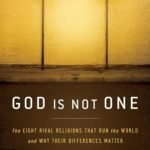Prothero, Stephen. God is Not One: The Eight Rival Religions That Run the World – and Why Their Differences Matter. HarperOne, 2010. ISBN: 9780061571275.
Meet the Author
 Stephen Prothero is professor of religion at Boston College and the author of six books including God Is Not One: The Eight Rival Religions That Run the World – and Why Their Differences Matter and Religious Literacy: What Every American Needs to Know – and Doesn’t. He writes and reviews for the New York Times, The Wall Street Journal, Newsweek, The Boston Globe, The Washington Post, USA Today, and Los Angeles Times. Prothero has commented on religion on National Public Radio and on such television programs as The Daily Show with Jon Stewart, The Oprah Winfrey Show, The O’Reilly Factor, and The Today Show. For more information, view Prothero’s website or visit his faculty page, which includes information about the courses he teaches a link to his curriculum vitae. Additionally, you can follow him on Twitter.
Stephen Prothero is professor of religion at Boston College and the author of six books including God Is Not One: The Eight Rival Religions That Run the World – and Why Their Differences Matter and Religious Literacy: What Every American Needs to Know – and Doesn’t. He writes and reviews for the New York Times, The Wall Street Journal, Newsweek, The Boston Globe, The Washington Post, USA Today, and Los Angeles Times. Prothero has commented on religion on National Public Radio and on such television programs as The Daily Show with Jon Stewart, The Oprah Winfrey Show, The O’Reilly Factor, and The Today Show. For more information, view Prothero’s website or visit his faculty page, which includes information about the courses he teaches a link to his curriculum vitae. Additionally, you can follow him on Twitter.
Book Basics
God is Not One seeks to dispel the popular idea that religious unity is attainable by explaining that different religions have different problems and goals. After an introductory chapter, Prothero explores in detail each of what he deems as the world’s eight greatest religions in their order of influence from greatest to least. His exploration of each religion considers four elements: a problem that the religion perceives, a solution to the problem, techniques for implementing the solution, and exemplars to demonstrate how to effectively go about it. The book’s first eight chapters, which address the greatest religions are
- Islam: The Way of Submission

- Christianity: The Way of Salvation
- Confucianism: The Way of Propriety
- Hinduism: The Way of Devotion
- Buddhism: The Way of Awakening
- Yoruba Religion: The Way of Connection
- Judaism: The Way of Exile and Return
- Daoism: The Way of Flourishing
So What?
Most people are quite familiar with only a few of the world’s great religions. How well do you know each of the religions Prothero counts among the eight greatest? Do you have opinions about any of them that are not backed up by knowledge? How might an intentional study of the world’s great religions (using this book or by reading other surveys or literature) benefit your understanding and better equip you for interreligious dialogue?
Prothero characterizes the problem of Christianity as sin, the solution as salvation, the techniques as some combination of faith and good works, and the exemplars as saints for Roman Catholicism and Orthodox and ordinary people of faith for Protestants. Would you agree or disagree with his assessment? If you disagree, what alternative would you offer?